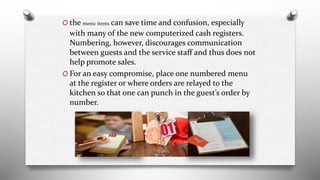The-Menu-and-its-courses
- 1. Prepared by: Lopez, Ma. Teresa BSIE-HE3C LEC.
- 2. O Menu is a printed brochure or public display on a poster or chalkboard that shows the list of options for a diner to select.
- 3. O Menu may be A LA CARTE in which guests choose from a list of options.
- 4. O And Menu may be TABLE D’HOTE, in which case a pre-established sequence of courses is served.
- 5. O Menu may display a list of wines and their prices, or this information may be available in a separate brochure called the wine list. Some restaurants may also have separate menus for beer, liquor, and mixed drinks, and for desserts.
- 6. O Menus vary a great deal in terms of their length and the amount of detail that they provide. In some restaurants, the entire menu fits on a single sheet of paper. In other restaurants, the menu is bound into a brochure or binder, as it contains a number of pages.
- 7. O A MENU may be long either because the restaurants carries an extensive selection of items, because of the menu has a lengthy description of each item and its preparation, or from a combination of these factors.
- 8. O The Menu is the waiter’s primary sales tool. It does more than just sell the food lists. It sells the entire establishment.
- 9. O The MENU always has to be clean, fresh, and up to date, with no crossed-out or penciled-in changes. It has to be presented by the waiter in a way that he indicates his pride in the menu and the establishment.
- 10. O The Menu can be extremely useful. It tells the customer that he may have to wait 20 to 30 minutes or more for some items; and it tells the sensible customer that he had better order a first course.
- 11. MENU FORMAT O In many cases, especially in restaurants, serving haute cuisine, the part of table d’hote menu is beautifully handwritten to emphasize the traditional character of the restaurant. In less fancy restaurants, a modern variant that is similar but simpler is often used: the blackboard, on which are written recommendations concerning the day’s specialties.
- 12. The table d’hote or a part menu, which changes daily or cyclically, is prepared in-house (on a typewriter or computer) and duplicated as necessary. A separate menu listing the daily specials might also be prepared. In many restaurants the table d’hote or a part menu and the daily specials contain only a fraction of what is offered.
- 13. Often an A La Carte menu, from which the guests can select from an array of dishes that are always available, is also provided. If an a la carte menu is offered, the other menus are inserted in or clipped to its folder. The daily menus may also be placed at every seat, but in most establishments they are offered by the service staff along with the regular a la carte menu.
- 14. O the menu items can save time and confusion, especially with many of the new computerized cash registers. Numbering, however, discourages communication between guests and the service staff and thus does not help promote sales. O For an easy compromise, place one numbered menu at the register or where orders are relayed to the kitchen so that one can punch in the guest’s order by number.
- 15. MENU COURSES O The Classical French menu was the basis of our modern menu today, which contains thirteen courses. Today, a menu of this size is hardly ever offered. But even today’s shorter menus follow the structure of the classical French menus as far as succession of courses is concerned. O They always start with something light to stimulate the appetite, build us to the main course, and then become lighter toward the end of the meal.
- 16. SEQUENC E FRENCH TERM ENGLISH TERM EXAMPLEs 1 Hors D'oeuvre Appetizer crepes-suzette 2 Potage Soup Chicken Consomme 3 Oeufs Egg Oeuf Cocotte ala crime 4 Farineaux Pasta Lasagna- napoletana 5 Poisson Fish and Seafood Tahitian Ceviche Coconut 6 Entrée First Meet Dish CheesesSteak 7 Relevé 8 Sorbet Flavored Ice Water 9 Roti Roast Roast chicken 10 Legumes Vegetables Cauliflower Mornay 11 Entremets Sweet 12 Savoureux Savory Scotch Woodcock 13 Desservir Dessert Welipa Table 11.2. Menu Courses
- 17. 12. Scotch Woodcock 9. Roast chicken 10. Cauliflower Mornay 6. Cheesesteak 13. Welipa
- 18. O Although not part of the thirteen courses, coffee may be offered at the end of a meal and may include different varieties like filter, cappuccino or cona coffee.
- 19. Thank you


















